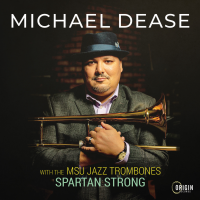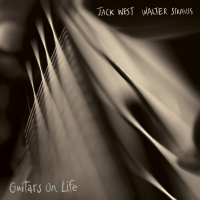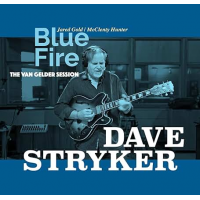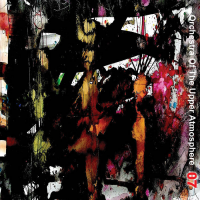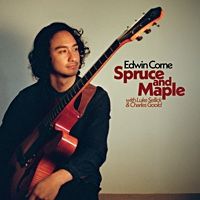Home » Jazz Articles » Album Review » Ross McHenry: Waves
Ross McHenry: Waves
Building on the momentum from his 2020 album, Nothing Remains Unchanged, Waves feels like a natural progression. But this time, McHenry takes things farther, blending his knack for contemporary jazz with a more personal narrative, reflecting on everything from his own history to the devastating 2019 bushfires in Australia. Although the blueprint of this album is similar to Nothing Remains Unchanged, McHenry's writing feels more diverse and inventive here. He has added some top-tier musicians to the mix, bringing back Eric Harland on drums and Matthew Sheens on piano, while new members Donny McCaslin on tenor sax, Adam O'Farrill on trumpet and Ben Monder on guitar add fresh textures.
From the moment the title track kicks off, one has the sense that McHenry knows how to weave together catchy themes with surprising improvisational turns. "Waves" starts off with a smooth hypnotic groove, which gradually unfolds into intricate layered improvisations, especially as the trio locks into some dynamic exchanges. As a trio piece, it begins with simple melodic lines, but as the musicians engage in dynamic interplay, the composition gains momentum and erupts with Sheen's brilliant piano bravuras. Sheen's work really shines here, and the interplay between the musicians feels both relaxed and incredibly tight, as if they have spent years navigating these musical conversations together. The track was inspired by memories of watching the horizon during the wildfires, and one can really feel that blend of calm and underlying intensity.
One of the highlights, "In Landscape," lets McHenry's ensemble stretch out and explore different ideas in a more spontaneous way. McCaslin, O'Farrill and Monder take turns showcasing their improvisational chops, but it never feels disjointed. There is a real sense of flow and cohesion, as if each player knows exactly when to step forward and when to step back. It is the balancing act between structured melodies and improvisational freedom that keeps the music engaging from start to finish.
That said, Wave is not all intensity. One of the more personal tracks, "July 1986," is a tribute to McHenry's twin brother, Angus, who passed away in infancy. McHenry's compositions—especially here—are not merely technical exercises. They are meditations on life, memory and loss. There is a mournful beauty to this track, and one has the sense that everyone is digging deep into the heart.
"July 1986" opens with a prolonged atmospheric introduction on keyboards, setting a meditative tone before the pianist enters with soft delicate strokes, accompanied by Harland's deft brushwork. McCaslin's saxophone, rich with emotion, glides through the composition in a reflective ruminative manner, imbuing the piece with its most defining color. Monder's guitar quietly adds subtle textures in the background, creating a layered immersive ambiance. His solo, more painterly than virtuosic, anchors the piece with a sense of artistry, supported by the gentle cascading piano note, which add depth and nuance to the atmosphere. Motion is less marked by rhythm than by the arcs and swells inside the narrative improvisations.
"North of the River" is a nostalgic look back at McHenry's childhood. The imagery is vivid—wet sleeves, rubber boots, cold streams—and the music reflects that simplicity and purity. Here, as throughout the album, the musicians explore not just technical virtuosity but also the emotional terrain underlying McHenry's compositions. The main theme is undeniably appealing and melodic, acting as a springboard for solos, which follow in turn. O'Farrill and Sheen build a playful yet reflective atmosphere and—once again—Harland's detailed drumming ties everything together. Each soloist takes their moment to shine, but it is the collective sound of the band that leaves the biggest impression.
The closing track on Waves, "1989," is a deeply evocative piece characterized by its tender piano and mournful theme. The composition unfolds slowly, allowing the emotions to resonate fully. It unhurriedly proceeds towards its many climaxes. McCaslin's solos add a trancelike quality, contributing to an otherworldly atmosphere reminiscent of his work on Bowie's Blackstar.. (More on Blackstar is here). This creates a captivating sonic storm, which pulls the listener into a profound emotional space.
The music on Waves reflects the strength of a well-connected ensemble, where each musician plays an important role in shaping the overall sound. It is not about flashy solos or showy performances; it is about thoughtful compositions and a deep understanding of how to balance the old and the new in jazz. McHenry is not afraid to push the boundaries, but he does it in a way that feels natural and grounded in tradition. This balance between creativity and respect for jazz's roots makes Waves an engaging and rewarding listen.
Track Listing
Waves; In Landscape; Love and Obscurity; July 1985; Odysseus in Brooklyn; North of The River; 1989.
Personnel
Ross McHenry
bass, electricEric Harland
drumsDonny McCaslin
saxophone, tenorAdam O'Farrill
trumpetBen Monder
guitarMatthew Sheens
pianoAlbum information
Title: Waves | Year Released: 2024 | Record Label: Earshift Music
Tags
PREVIOUS / NEXT
Support All About Jazz
 All About Jazz has been a pillar of jazz since 1995, championing it as an art form and, more importantly, supporting the musicians who make it. Our enduring commitment has made "AAJ" one of the most culturally important websites of its kind, read by hundreds of thousands of fans, musicians and industry figures every month.
All About Jazz has been a pillar of jazz since 1995, championing it as an art form and, more importantly, supporting the musicians who make it. Our enduring commitment has made "AAJ" one of the most culturally important websites of its kind, read by hundreds of thousands of fans, musicians and industry figures every month.

















